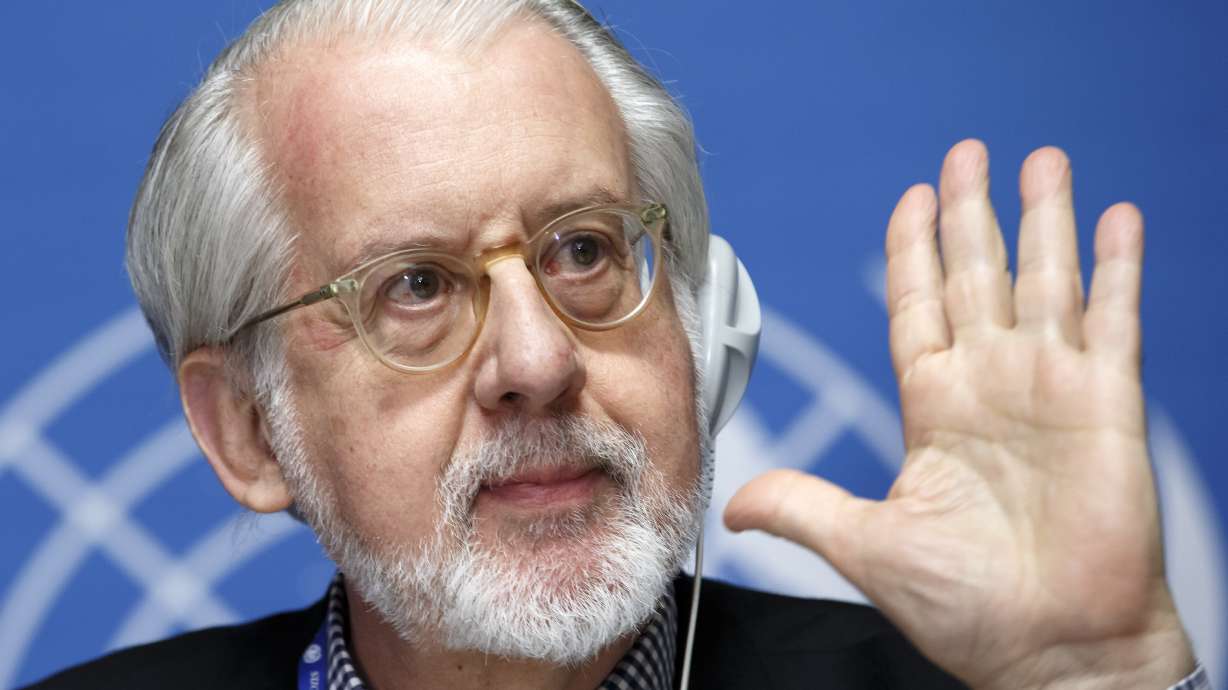Estimated read time: 2-3 minutes
This archived news story is available only for your personal, non-commercial use. Information in the story may be outdated or superseded by additional information. Reading or replaying the story in its archived form does not constitute a republication of the story.
GENEVA (AP) — Evidence shows chemical weapons used in two attacks came from the Syrian government's stockpiles, a panel of U.N. investigators said Wednesday in a new report that needled world powers as deserving some of the blame for the country's atrocities because of their inaction.
The human rights experts said they confirmed the use of chemical weapons, specifically sarin, in the Damascus suburb of Ghouta on Aug. 21, an attack in which the U.S. government said 1,400 people died and that prompted a U.S.-Russian agreement to eliminate Syria's chemical weapons by mid-2014. Their report said they also confirmed the use of sarin in an attack on March 19 of last year in the village of Khan al Assal outside the city of Aleppo.
In Ghouta, the report said, significant quantities of sarin were used in a well-planned attack targeting civilian-inhabited areas, causing mass casualties. It said the evidence indicated that the perpetrators "likely had access to the chemical weapons stockpile of the Syrian military, as well as the expertise and equipment necessary to manipulate safely large amount of chemical agents."
The chemical agents used in the attack in Khan Al-Assal, it said, "bore the same unique hallmarks" as those used in Ghouta.
The panel's experts identified more than 40 government-run detention centers with documented torture cases and said widespread attacks and sieges on civilian areas in Syria by pro-government forces are leading to mass casualties, malnutrition and starvation. They said rebels have committed war crimes, including murder, executions, torture, hostage-taking, enforced disappearances, rape and using child soldiers.
But the commission chaired by Brazilian diplomat and scholar Paulo Sergio Pinheiro also concluded the five permanent U.N. Security Council members — Britain, China, France, Russia and the U.S. — have failed to act on all of Syria's "grave violations" that threaten international peace and security.
Syria's main allies, Russia and China, have repeatedly blocked proposals by the West before the Security Council, the U.N.'s most powerful arm.
"Such inaction has provided the space for the proliferation of actors in the Syrian Arab Republic, each pursuing its own agenda and contributing to the radicalization and escalation of violence," their report said. "The Security Council bears this responsibility."
The panel, authorized by the U.N.'s 47-nation Human Rights Council in Geneva, has previously concluded that it believes the Syrian government is committing a crime against humanity by making people systematically vanish, and that rebels have also been making their opponents disappear and running secret prisons.
The report Wednesday recommended that countries with influence in Syria, particularly the permanent Security Council members, exert more pressure "to end the violence and to initiate all-inclusive negotiations for a sustainable political transition process in the country" and also refer the conflict for prosecution, possibly the International Criminal Court at The Hague, Netherlands.
Copyright © The Associated Press. All rights reserved. This material may not be published, broadcast, rewritten or redistributed.









